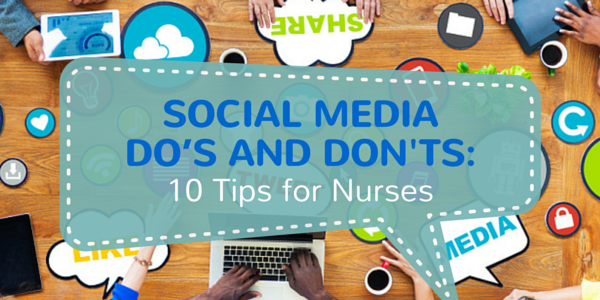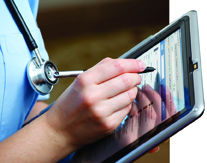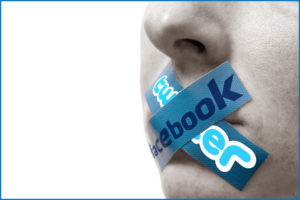Social networking for nurses is just a bit more complicated than for the average Joe; there are potential landmines to avoid and social practices to embrace. Have you heard of that nurse who got fired for venting about her patients on social media? Or that nurse duo that posted inappropriate photos during work hours? Don’t be that person who loses her job because of mistakes on social media.
Here are some social media do’s and don’ts for you if you’re a nurse looking to network personally or professionally.
DO promote the nursing profession for better public awareness.
The nursing profession could always use any kind of good publicity, and what better way to promote your industry than through social media where news travels faster than a viral infection?
Different social media channels are available to you, depending on which you prefer and how much information you want to disseminate. There’s Twitter, where you can sum up your thoughts on the industry in 140 characters or less. There’s Facebook, where you can post not just statements, but also photos or videos and connect with others in the industry through groups and fan pages.
Discussion groups allow nurses to connect and discuss the latest issues and trends with like-minded people. If you have a talent for writing, you could also turn to blogging, where you can discuss nursing topics in depth.
Also Read: Top 100 Nursing Blogs That Matter
DO talk about healthcare-related interests.
Stay visible and relevant in the social media sphere by talking about your interests in the healthcare and nursing fields. Discussing the latest news about your work-related interests increases your online visibility and creates awareness among people not in the industry.
Not only would this show your dedication to your profession, but it would also be a great calling card for potential employers looking for people who want to get ahead in their careers. You could also be educating young people who are interested in entering the nursing and health care field.
Also Read: 15 Awesome Nurses You Should Follow on Pinterest
DO present yourself in a respectable and professional manner online.
Your bedside manner shouldn’t end when you leave your workplace. This extends to your interactions in social media. Put a human face to the profession by acting responsibly and professionally when you post, whether it be on Twitter, on Facebook, or in a discussion group.
Netizens are more inclined to believe and respect a nursing professional who knows how to conduct himself or herself with self-respect and professionalism, especially when talking about industry-related topics with the intent of educating the masses.
DO maintain professional boundaries with patients.
Has a patient added you on Facebook, or other social networking sites? Do note that even if a patient has added you on social media, it doesn’t give you license to talk about your patient’s case.
If you should talk to a patient in social media, keep it professional and stick to topics that aren’t related to the workplace or your patient’s medical history. Perhaps the patient is interested in healthcare topics that could give them further insight into their own case; in this instance you could talk about the broader topic without having to touch on the patient’s case in particular.
DO utilize social media on your own time and your own device.
Just because you are doing social networking for nurses, doesn’t mean that you are allowed to do this on company time or resources.
Health care organizations often have policies in place against the use of company time or resources for non-work activities like social media, even if you are posting about the industry. Unless your job involves directly working on social media, you’re not being paid to post your thoughts while on the job.
And now, for the Don’ts…
DON’T assume that your private posts would always remain private.
People, not just nurses, often make the mistaken assumption that whatever they post to a select few people only stays within that circle. Don’t fall under that false sense of security. ALWAYS assume the worst when you post on social media.
Just like the nastiest gossip, your private post will always find a way to become shared with random strangers. Always operate under the idea that you cannot control the privacy of your posts and that someone is bound to inadvertently share whatever you said.
DON’T share confidential information about work.
The nursing industry is all about privacy and confidentiality, especially as work involves dealing with patients and their problems. Humanizing the nursing profession doesn’t mean blowing off steam online about your supervisor or another colleague in an attempt to show that not all nurses are robots.
Stringent policies are always in place to protect both the worker and the workplace. Learn to respect these policies and operate within its boundaries online. This will save you any headache down the road should you even think about discussing what you think about the new hire.
Also Read: 20 Effective Ways to Deal with Angry Patients (and Families)
DON’T post photos of or information about patients.
Remember that you have an obligation to protect your patient’s privacy. NEVER post any kind of information about your patient’s condition, or even a photo of your patient, on social media.
Not only does it violate patient confidentiality, it could also be grounds for a potential lawsuit against you or your workplace, apart from other negative repercussions.
Even if your patient gives you permission to post his or her information, your employer might have strict rules against this. In this case, it is always in your best interest to follow workplace policy instead of your patient’s opinion. Your patient may not get you fired for this infraction, but you can be sure your workplace could take action.
DON’T make disparaging comments about patients.
Not only must you not discuss a patient’s medical history on social media, you must also refrain from making any negative comments about a patient, no matter how irascible they may be. This would still fall under violation of a patient’s privacy and confidentiality.
Don’t even assume that you can make these comments anonymous, or keep the patient’s identity a secret. You’re not the only one working with the patient; chances are, a colleague would recognize who you’re talking about.
DON’T post compromising information about yourself, your boss, or your work.
Remember that your actions and statements online also reflect your professional persona, especially if you’re also active in the online sphere around your industry. In this vein, refrain from posting information about yourself or your workplace that could lead to negative results down the line.
This means not posting about how drunk you were after the party you attended, no matter how funny it seemed at the time. Be mindful of how your actions online could affect your own job, no matter how unrelated it seems. Think for a minute how that post will be interpreted by your bosses or colleague before you press that submit button.

Used carelessly and thoughtlessly, social media for nurses is a recipe for disaster. We’d post real-life examples but a lot of them are graphically disturbing. In the final analysis, there is only one ultimate rule to remember – protect the dignity of your patients, your workplace, your profession, and yourself.
If you can keep these tips in mind, you will surely reap the rewards of responsible social networking for nurses.
























